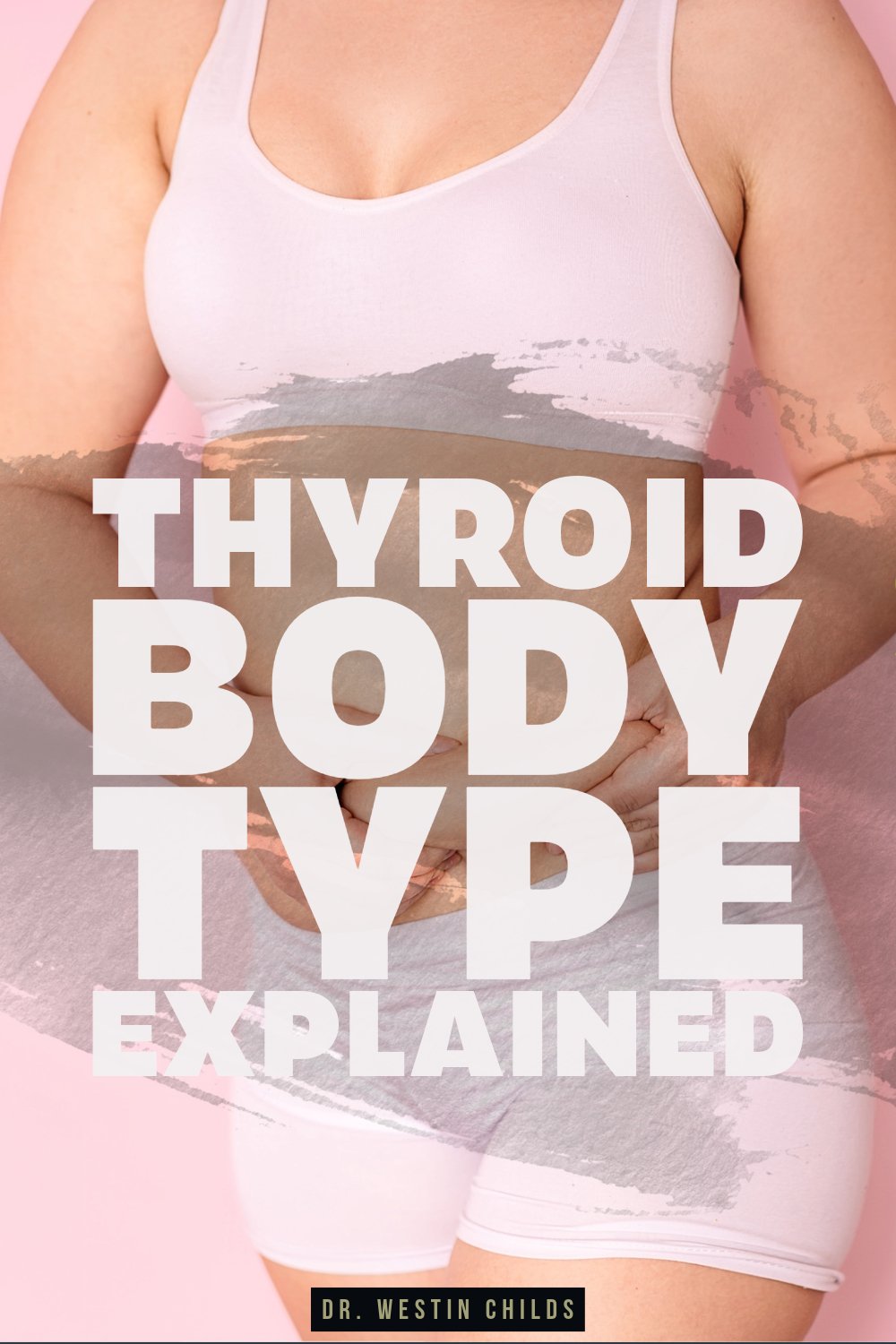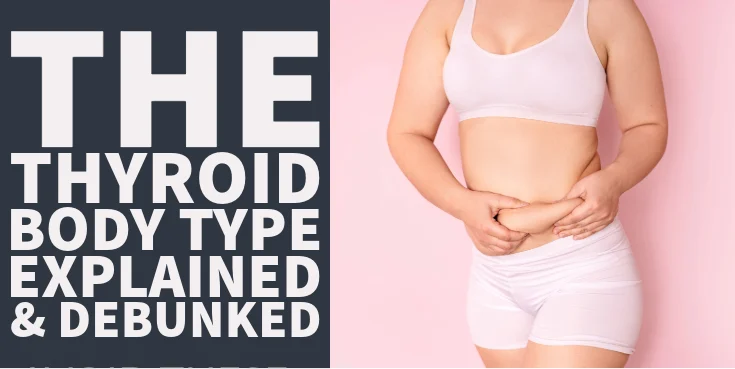Are you predestined to have a specific body type just because you have a thyroid problem?
Definitely not.
But is it the case that some common trends occur among patients with thyroid conditions?
Absolutely.
And it’s this idea that has led to the theory of the thyroid body type.
This theory suggests that if you have a thyroid problem, you will end up with certain physical characteristics that you will share with other people with the same problem.
It goes even further to suggest that people with this thyroid body type not only look similar, but also have similar thoughts, have similar food cravings, gain weight in specific locations, and more.
How does this theory stack up in the real world, though?
Let’s break down what makes up a thyroid body type and find out:
DOWNLOAD FREE RESOURCES
Foods to Avoid if you Have Thyroid Problems:
I’ve found that these 10 foods cause the most problems for thyroid patients. Learn which foods you should avoid if you have thyroid disease of any type.
The Complete List of Thyroid Lab tests:
The list includes optimal ranges, normal ranges, and the complete list of tests you need to diagnose and manage thyroid disease correctly!
Claim #1: Thyroid Body Types are Prone to Weight Gain in Their Hips, Thighs, and Waist
First, the claim is made that thyroid body types are prone to weight gain in their hips, thighs, and waist.
And while this is certainly true for some thyroid patients, it’s not true for everyone.
When you look at thyroid physiology, there’s no question that thyroid patients are prone to weight gain in general.
But that weight gain is not as pronounced as most people think (1) and it’s usually not related to just fat mass.
In fact, much of it is related to water weight.
As someone with a thyroid problem, you can expect to gain 10-15 pounds of extra weight on your body.
But there’s nothing magical about the low thyroid states that drives fat specifically to one area over another.
Thyroid weight gain is usually distributed fairly equally over the body, but some people will notice they preferentially gain weight in certain locations over others.
The reason for this has to do with genetics and hormones (2).
If you are someone that gains weight primarily in your lower body and butt region, that weight gain is almost certainly driven by estrogen and progesterone imbalances.
In this way, your thyroid sets the stage for weight gain by reducing your metabolism, but it’s your other hormones that drive it to specific locations.
Knowing this means you can look at the distribution of fat on your body and get an idea as to what type of hormone problems you may have.
You should always test to confirm, but this information can definitely be useful.
By the way, are you somebody who gains weight in your hips, thighs, or butt region? Or does it occur elsewhere on your body?
Leave a comment below so we can get an idea of how each person is different.
Claim #2: Thyroid Body Types Should Eat Less Protein
The next claim has to do with diet.
Thyroid body types are told that they should consume less protein.
The reason for this recommendation has to do with the impact that thyroid dysfunction has on metabolism.
While the idea that thyroid patients gain weight in a similar distribution does seem to be somewhat valid, this is one recommendation that should probably be avoided.
Why?
Because it’s precisely the reason that thyroid patients have a slower-than-normal metabolism they should eat more protein.
Protein is needed for muscle synthesis and your lean muscle mass represents about 20-25% of your resting metabolic rate (3).

Your thyroid controls more at around 50-60% but 20-25% still represents a significant number that you can impact.
Knowing this, why would you intentionally reduce your protein consumption which would only serve to reduce your metabolism when you already have a slow metabolism to begin with?
This recommendation doesn’t make any logical sense.
It’s been my experience that thyroid patients do better with more protein, not less, because of its impact on metabolism.
Claim #3: Thyroid Body Types Should Avoid Cruciferous Vegetables
This recommendation is grounded in some science but fails to take into account the pros and cons that vegetables offer thyroid patients.
Is it true that certain vegetables contain compounds that can block the uptake of iodine into the thyroid gland?
Yes, and we call these compounds goitrogens (4).
They carry this name because they may lead to the condition of a goiter which is enlargement of the thyroid gland.
The most common cause of goiter is iodine deficiency which is made worse by the consumption of foods that contain iodine-blocking compounds.
But to look at vegetables through this lens misses out on some of their greatest benefits:
Their bioactive compounds.
And its these compounds that support the immune system, inflammation, gut health, glutathione, longevity (5), and more.
When you take a more even-handed approach, it’s clear that even if veggies do have some potential for harm, their pros outweigh their cons.
Now, if only there were a way to get all of these benefits without worrying about the goitrogens they contain, wouldn’t that be nice?
Oh wait, there is.
It’s called steaming and boiling your vegetables before you eat them!
Studies show that you can reduce the goitrogenic content of vegetables by 30-50% (6) just by steaming them.
And if that isn’t enough, you can simply increase your intake of iodine via supplements to outcompete the action of the remaining goitrogens that stick around.
So, no matter what, there’s really no good reason to avoid vegetables if you have a thyroid problem because you can have your cake and eat it too.
Claim #4: Thyroid Conditions are Secondary to Estrogen Disorders or Liver Problems
This claim is clearly inaccurate.
We know from massive population studies that the most common cause of hypothyroidism in developed countries is the autoimmune disease Hashimoto’s thyroiditis.
And it’s not even close.
Current estimates are that around 90% of all cases of hypothyroidism are caused by this condition (7).
But there is some truth to the idea that other conditions in the body may impact the thyroid.
This is especially true when you look at liver health.
Right now, we have a silent epidemic of liver damage in the form of non-alcoholic fatty liver disease from insulin resistance and sugar consumption.
And because the liver is the major site of thyroid hormone activation (8), liver damage can and will make thyroid problems worse.
A similar, but different, situation occurs with estrogen disorders.
Estrogen is responsible for regulating the protein that binds and carries thyroid hormone through the bloodstream (9).
If estrogen isn’t regulated within a fairly tight range, it’s possible that it may impact how much thyroid hormone is available for use by the body.
So is estrogen and liver health important if you have a thyroid? Definitely.
But are disorders with either the main cause of thyroid problems? Definitely not.
Claim #5: Thyroid Body Types Have Cravings for Sweets, Caffeine, and Starches
This one is probably more true than false, but the implication of it being true isn’t all that helpful.
It just reinforces what we already know about thyroid physiology. Which is this:
Thyroid patients are more prone to developing insulin resistance.
And in states of insulin resistance, the body has a difficult time burning fat as an energy source. It remains locked up in fat cells (10).
As a result, they will often have cravings for sugary sweets and carbs to provide a quick boost of glucose that the body can use instead.
The reliance on caffeine is also easily explained.
It’s a common habit among thyroid patients because one of the major symptoms of hypothyroidism is fatigue.
Thyroid patients have learned that they can fight this fatigue with sugar and caffeine, especially when combined together.
But doing this is not a good idea because the energy you get from both is short-lived and they ultimately serve to make your condition worse in the long run.
The better solution is to reverse insulin resistance so your body can use fat as energy and gain natural energy by improving your thyroid or taking adrenal supplements.
Claim #6: Thyroid Patients Have a Characteristic Body Shape and Size
According to the theory, the thyroid body type is characterized by the following physical findings in women:
- Long arms and legs
- Small bones
- A short waist
- A shoulder width that is close to the width of their hips
- A round rear (butt)
- And an oval or long face
The problem with this claim is that there’s virtually no evidence to support it and we can easily debunk it by just looking at thyroid patients.
Over the years, I’ve seen hundreds of them and, in my experience, they vary in shape and size dramatically.
If you want, you can compare your own body shape to the characteristics listed to see how accurate they are for you.
All in all, I think we can safely say that the whole body type theory is easily disproved.
It may seem attractive because of its simplicity, but the evidence doesn’t support it.
The reality is that each thyroid patient is unique.
And that means these cookie-cutter treatment programs just won’t cut it.
That said, there are some general rules and principles thyroid patients should follow when it comes to managing their diet.
And if you want to learn more about those, make sure to check out this article next.
Scientific References
#1. https://www.ncbi.nlm.nih.gov/pmc/articles/PMC6711558/
#2. https://www.ncbi.nlm.nih.gov/pmc/articles/PMC6795075/
#3. https://www.ncbi.nlm.nih.gov/pmc/articles/PMC11015637/
#4. https://www.ncbi.nlm.nih.gov/pmc/articles/PMC11012840/
#5. https://www.ncbi.nlm.nih.gov/pmc/articles/PMC10459432/
#6. https://www.ncbi.nlm.nih.gov/pmc/articles/PMC10573036/
#7. https://www.ncbi.nlm.nih.gov/books/NBK459262/
#8. https://www.ncbi.nlm.nih.gov/pmc/articles/PMC10860496/
#9. https://pubmed.ncbi.nlm.nih.gov/11095487/
#10. https://www.ncbi.nlm.nih.gov/pmc/articles/PMC9754850/









